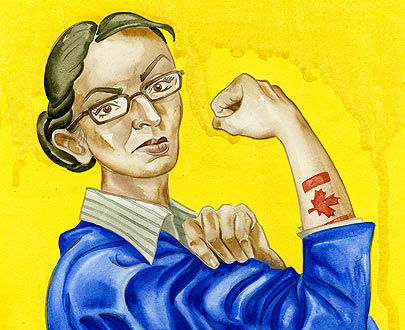| Immigrant Women in Canada
The Canada eZine - Feminism
Immigrant women may be the stronger sexNovember 3rd 2007. This week Statistics Canada released a patchy report highlighting the disparity between second-generation men and women. The latter, it turns out, are outperforming their male counterparts academically and economically by a wide margin. While the report was long on demographic and economic data – second-generation women earn more than women with similar education whose parents were born in Canada, while second-generation men earn considerably less than their male peers – there was little that actually explained why. It suggested that delayed marriage and child rearing, as well as better access to high-paying jobs in urban areas may contribute to the comparative success of second-generation women. But the sweeping generalizations offered in the report – aimed to support the data, not the other way around – are indicative of social science's inability to measure the nuanced philosophical, cultural and historical dynamics often at the heart of such trends. And they diminish the courage and adaptability women have historically exhibited when faced with the challenge of survival between two worlds. Numbers can't convey the story of second-generation women so hungry for opportunity in the West once freed from the strictures of traditional family roles. Nor can statistics account for the sometimes crippling effects young men swaddled in emotional privilege face when thrown into the chilly Canadian melting pot. The vast majority of Canada's current second-generation population have roots in China, South Asia and the Caribbean, while others trace their origins to the Middle East and Africa. While demographers and anthropologists remain vexed by the worlds these Canadians occupy, their stories have been told by authors such as M.G. Vassanji, Terry Woo and Shauna Singh Baldwin. In the background of stories such as Vassanji's No New Land and Baldwin's Montreal 1962, and the foreground of Woo's Banana Boys, many questions left unanswered by the StatsCan report are addressed for readers who benefit from the understanding of why women often do better than men. "I think very often men experience a state of shock when coming to the West while women experience a rise in status," explains Baldwin, a Canadian who makes her home in Wisconsin. "Women become the protectors of men. There's a role reversal that takes place." In Montreal 1962, one of the short stories compiled in English Lessons and Other Stories a Sikh couple recently emigrated from India unexpectedly encounter discrimination as the turban-wearing husband is unable to find a job because of his appearance. While the husband, the bread winner, internalizes the dilemma as a paralyzing struggle between the obligation to his religious-cultural identity and the need to survive, the wife ultimately makes the bold decision her husband is unable to: You will not cut your hair, and stop wearing your turban, she insists, and everything will be just fine. "Women are responsible for the future," Baldwin says. "Quite often men are responsible for the preservation of the past and the continuity of the family line, it's the burden of masculinity. And women are culpable because we often teach our sons how to be, we teach them this type of masculinity." While women thrive, she says that's why second-generation men are inevitably shaped by the traditional notion of masculinity that traps so many boys under the weight of expectations. It's the type of masculinity chronicled daily in the news as Sri Lankan male youths in Toronto wage war with each other to preserve the dignity of their family name, young Muslim men get charged for allegedly plotting to destroy buildings and second-generation male Punjabi Canadian teenagers find solace from a harsh world in a growing number of rival gangs. Meanwhile second-generation women dominate university campuses and gain a foothold in the corporate world, as they promise to fulfill the dreams of their immigrant parents. "It (the role reversal) can be empowering for women once they arrive in the west," Baldwin says, "but it's also kind of sad, they have to turn into something they weren't intending to be." Woo, whose Banana Boys has been lauded as the most honest depiction of the struggles faced by young second-generation Canadian-born Chinese men, agrees with Baldwin's characterization of the masculinity that many in his generation are unable to balance. "It's difficult to not succumb to the pressure that second-generation men face. They have to compete with each other for everything, they have all the pressure from the parents, two or three millennia of cultural programming. Some guys go bug wild and completely resist it or melt down. "When you look over at women, it's almost as if they're free from all that. What counted as an advantage for men in the previous culture, where they were favoured, is now a burden. And for women, who weren't valued as equal in terms of their potential, they're now free, they're almost more motivated to pursue their heart's desire." In Vassanji's No New Land, while the protagonist Nurdin Lalani walks like a ghost through his troubled new life in a strange place called Don Mills, recalling his haunted past in Africa, the women in the backdrop – resilient and firmly fixed toward the future – provide hope that everything will be just fine. The statistics can't explain that.
|
|
